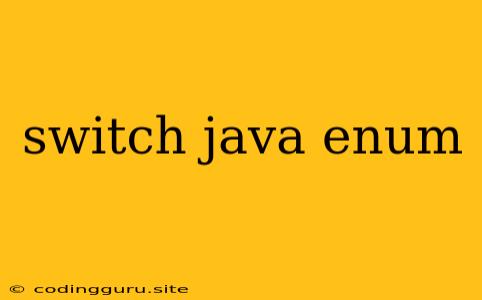Understanding and Using switch with Java enum
Java's enum (short for enumeration) provides a powerful way to define a fixed set of constants, enhancing code readability and maintainability. But how do you effectively use these constants in switch statements, a common control flow mechanism in Java? This article will guide you through the process, exploring its benefits and providing practical examples.
What are Java Enums?
Enums are special classes in Java that allow you to define a set of named constants, often representing a finite number of choices or states. Each constant is effectively an instance of the enum class. Let's illustrate with an example:
public enum DayOfWeek {
MONDAY, TUESDAY, WEDNESDAY, THURSDAY, FRIDAY, SATURDAY, SUNDAY;
}
In this example, DayOfWeek is our enum. It contains seven constants representing the days of the week.
Why Use switch with enum?
Combining switch statements with enum offers several advantages:
-
Enhanced Readability:
switchstatements, when used with enums, make your code more intuitive and easier to understand. Instead of using magic numbers or string comparisons, you directly use the enum constants, making the logic clear. -
Type Safety:
enumconstants are strongly typed, eliminating potential errors due to incorrect input values. The compiler ensures that yourswitchstatement handles only the validenumconstants. -
Maintainability: Adding or removing days from the
DayOfWeekenum would automatically reflect in theswitchstatement, reducing potential errors and simplifying code maintenance.
How to Use switch with enum
Here's how to effectively use switch statements with enums in Java:
public class EnumSwitchExample {
public static void main(String[] args) {
DayOfWeek today = DayOfWeek.MONDAY;
switch (today) {
case MONDAY:
System.out.println("It's Monday, start the week strong!");
break;
case FRIDAY:
System.out.println("TGIF! Enjoy the weekend.");
break;
default:
System.out.println("It's another day in the week.");
break;
}
}
}
Explanation:
-
We declare a variable
todayof typeDayOfWeekand assign it the valueMONDAY. -
The
switchstatement usestodayas the expression to be evaluated. -
Each
caselabel corresponds to a specificenumconstant (MONDAY,FRIDAYin this case). -
The
defaultlabel handles any other possible values fortoday. -
The
breakstatement is essential to exit theswitchblock once a matchingcaseis found, preventing fall-through to the next case.
Additional Tips:
-
Case Sensitivity: Remember that Java is case-sensitive. The enum constants in the
switchstatement must match the case of the constants defined in the enum class. -
No Need for
toString(): You don't need to use thetoString()method when comparing enum constants in aswitchstatement. Theswitchstatement automatically compares the underlying values of the enums. -
Explicitly Handle All Cases: It's good practice to handle all possible
enumvalues in yourswitchstatement, either by explicitly using acaselabel for each or using adefaultlabel to capture any remaining values. This approach makes your code more robust and less prone to errors.
Benefits of Using switch with enum
-
Improved Code Clarity: Using
switchwithenummakes your code more readable and easier to understand. You're working with named constants, making the logic crystal clear. -
Enhanced Type Safety: Enums provide type safety, ensuring that the
switchstatement handles only valid enum values. This helps prevent runtime errors and makes your code more reliable. -
Simplified Maintenance: If you add or remove enum values in the future, the
switchstatement will automatically update, eliminating potential errors and reducing maintenance efforts. -
Flexibility with Multiple Values: If you need to handle multiple
enumvalues within a singlecase, you can use a comma-separated list:
switch (today) {
case MONDAY, TUESDAY, WEDNESDAY, THURSDAY, FRIDAY:
System.out.println("It's a weekday.");
break;
case SATURDAY, SUNDAY:
System.out.println("It's the weekend!");
break;
}
Conclusion
Combining switch statements with Java enums is a powerful practice that enhances your code's readability, maintainability, and type safety. It's a versatile approach for handling finite sets of values, making your code more robust and less prone to errors. By understanding the principles and utilizing these techniques, you can significantly improve the quality and efficiency of your Java code.
